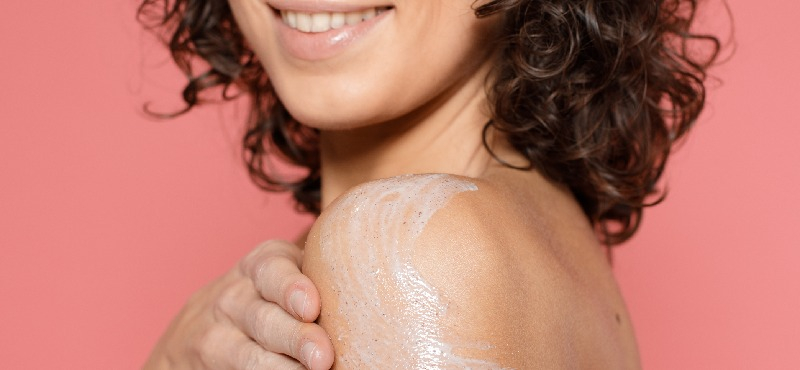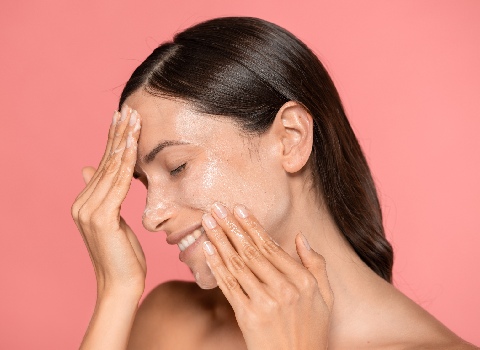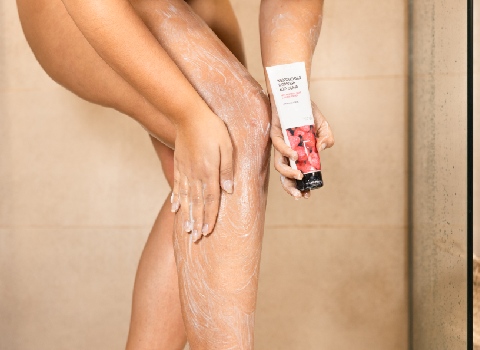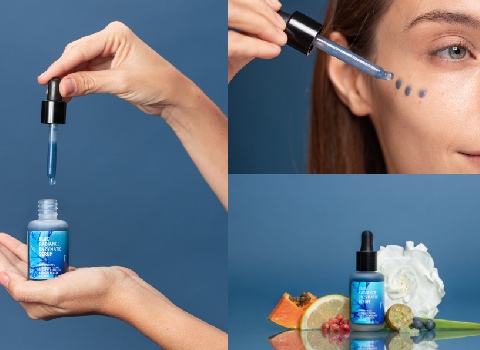WHY EXFOLIATE MY SKIN? IT'S THE KEY TO EVEN, LUMINOUS SKIN. DISCOVER ALL THE DETAILS...

Here are your essentials
for making it this far
Do you use self-tanners, but never like the result on your skin? Do pimples appear in certain areas of your body, and you don't understand why? Or, on the contrary, does your skin look flaky and dull…? It all has the same origin and is related to the cellular renewal of your skin, but we have good news! There's a simple solution—you need to exfoliate your skin. Let's tell you all about it in more detail.
What is exfoliation?
Also known as peeling, exfoliation is the process of removing dead cells and impurities from the different layers of the skin. The main objective of exfoliation is to promote skin renewal, improve its appearance, and achieve healthier, brighter, and more even skin.
To achieve this, it is common to use cosmetic products that help eliminate those dead skin cells and impurities that resist shedding naturally, thus regulating the skin's cellular renewal process. (Spoiler: We'll tell you more about cellular renewal later)
Benefits of exfoliation
So, what are the main benefits of exfoliating our skin?
- One of the main benefits, and probably the one you've heard the most about, is that exfoliants help deeply cleanse the pores and prevent excessive sebum (oil) buildup. This significantly reduces blackheads, pimples, and marks.
- But that's not all; another advantage of exfoliation is that it stimulates the blood microcirculation, which contributes to preventing the accumulation of impurities and dead cells, often responsible for dull-looking skin.
- Furthermore, an important aspect we sometimes overlook is that the cosmetic products we use in our skincare routine will penetrate better and be more effective, leading to healthier, smoother, and more radiant skin.
Types of exfoliants
At this point, you might be wondering, "Okay, but what types of exfoliants are there? And which one should I choose?" We'll help you with that. There are two types of exfoliants:
- Physical exfoliants: Physical exfoliants are those that contain visible granules and particles that remove dead cells through friction generated by massaging your damp face with these particles. One drawback of this type of exfoliant is that it can cause skin irritation, depending on the pressure applied. Moreover, some physical exfoliants may contain microplastics (not environmentally friendly as they are not water-soluble) or natural ingredients such as bamboo powder, almond shells, raspberry seeds (a more eco-friendly option offered by natural cosmetics). Physical exfoliants are available for both the face and body.
- Chemical exfoliants: Acidic and enzymatic exfoliants eliminate cells without friction or rubbing; they act evenly on all areas and are applied directly to the face like a cream without the need for scrubbing. They achieve uniform exfoliation through the chemical breakdown of cells. Within this category, there are two subtypes:
- Acids: such as AHA (Alpha Hydroxy Acids), BHA (Beta Hydroxy Acids), glycolic acid, malic acid, mandelic acid, citric acid, etc.
- Enzymatic: in these cases, enzymes—natural molecules (usually from plants)—are used to break the bonds between dead cells and shed them without damaging living cells. They are much gentler on the skin, even on the most sensitive skin types.
What is cellular renewal, how does it relate to my skin's appearance, and exfoliation?
Our body, like that of many other animals, has the ability to renew most of its cells. This ensures their preservation and proper functioning. Almost all our organs have cells capable of renewing themselves, at varying intervals. For example, red blood cells only live for about 120 days, and the cells lining the stomach last for a couple of weeks. Did you know that?
Therefore, we understand cellular renewal as the ability of cells to reproduce and produce genetically identical cells that replace the original stem cells functionally and physiologically.
With regards to our skin, (the largest organ in our body) the approximate time it takes for cells to renew is 28 days.
Keeping this in mind, we can find ourselves in two completely opposite scenarios:
- Accelerated skin cellular renewal: This can be identified by the proliferation of acne, clogged pores, and inflammation.
- Slow skin cellular renewal: This can be identified by dull, flaky, and dehydrated skin.
That's why it's soooo important to exfoliate our body and facial skin once or twice a week. This way, we'll be helping it renew more easily and eliminate anything it doesn't need. This will also reflect on the exterior, as we'll notice our skin becoming healthier, smoother, more even, soft, and radiant.
Include an exfoliant in your facial and body care routine, and observe the difference in your skin. We look forward to hearing from you...
Freshly wants to tell you something! At Freshly we keep on learning every day how to make decisions that bring us closer to a better future. Sometimes we are called dreamers, but what we really have is an optimistic vision and clear path for reaching that tomorrow.
Would you like to join this adventure? If you're here, it's because you are a demanding person when it comes to taking care of your body and the planet. By subscribing to the newsletteryou will receive articles like this one to continue learning, as well as news and exclusive discounts. Are you up for it?






